She has decided to stay in Ukraine, despite the Russian war of aggression. As an artist and feminist, she is surrounded by colonialist and sexist clichés. Only humor can help.
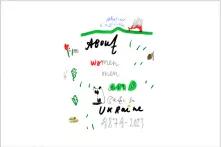
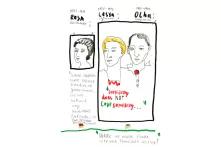
Oksana Semenik
Art historian, researcher, and author of the Twitter (now X) account “Ukrainian Art History”
Lesya Ukrainka (1871–1913) produced Ukrainian feminist literature and decolonial thought. Her friend and colleague was Olha Kobylianska (1863–1942), a pioneer of psychological prose whose work espoused the ideas of emancipation and feminism. They were contemporaries of Virginia Woolf and kept up with Western European thought. Ukrainka and Kobylianska corresponded and met each other, and their relationship can be described as very close. One should note that though they were both Ukrainians, they lived in different empires – Ukrainka in the Russian Empire and Kobylianska in the Austro-Hungarian Empire. In their letters to each other they wrote “someone loves someone”, and there is still debate in contemporary Ukrainian society about whether this indicated a queer relationship. But to quote the famous feminist Rosa Luxemburg, whose words appear in this picture: “Since Ukraine never formed a nation or government, [it] was without any national culture, except for the reactionary-romantic poems of Shevschenko.” So in her eyes these amazing women with their Ukrainian literature, language and feminism did not really exist.
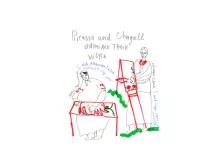
Oksana Semenik
Art historian, researcher, and author of the Twitter (now X) account “Ukrainian Art History”
There is a legend that Pablo Picasso and Marc Chagall saw works by Ukrainian peasant artists Maria Prymachenko (1909–1997) and Kateryna Bilokur (1900–1961) in Paris. They supposedly said that the creators of these works were geniuses and should be made famous all over the world. We don’t know if this is true or not, but art historians, journalists, and others have been eager to recount the story. Why does Ukrainian society still need legitimation from Western men? Perhaps it’s because hierarchies – men vs women, Western European art vs Ukrainian art, professional vs amateur – continue to exist in the art world. Will Prymachenko’s conceptual works and Bilokur’s magical flowers decline in value if this story isn’t told? Prymachenko was incredibly bold and imaginative: she painted flowers and animals and hid political statements in the titles of her drawings. And Bilokur, who lived in a patriarchal village, only got permission to paint after a failed suicide attempt. These women did not need the recognition of Picasso or Chagall; they recognised themselves.
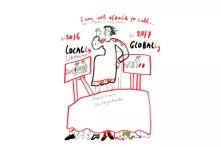
Galyna Kotliuk
Sociologist and gender relations researcher
Around the world #MeToo symbolises the fight against sexism, sexual harassment, and rape culture. In 2017 #MeToo was a response to a series of sexual harassment allegations against the famous Hollywood producer Harvey Weinstein. It quickly grew into a global phenomenon and a powerful movement of women fighting for their rights. Yet few people know that Ukrainian women were a year ahead of the rise of #MeToo: in 2016 Anastasia Melnychenko, a social activist, feminist, and director of the human rights NGO Studena, launched a Ukrainian-wide social media campaign to highlight the problem of sexual violence against women in Ukraine. It also got its name from a hashtag – #янебоюсьсказати, which translates to #IamNotAfraidtoTell – that women in the country used to share their stories. The #IamNotAfraidtoTell and #MeToo movements appeared almost simultaneously on different parts of the planet, but they were created in response to problems that every woman faces.
#IamNotAfraidtoTell shows that feminism is not alien to Ukraine. It is a part of our lives, our response to the violence that women experience every day. I’m not afraid to speak up about it either.
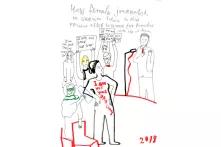
Olga Diachuk
Communications expert and former coordinator of the HeForShe movement in Ukraine
Ukrainian men and women are not only good at arguing online. They are also good at protesting and at uniting together in solidarity. The Revolution of Dignity occupies a prominent place in the anthology of Ukrainian protests, as it finally established us as a nation that knows how to defend its rights. The post-Maidan period is particularly notable for the fact that the conversation about human rights has become an integral part of public discourse, whether it’s the adoption of new laws or discussions across various media. On the eve of 8 March 2018, the campaign “I am not your darling” was launched by media experts Iryna Zemlianova and Yelyzaveta Kuzmenko in response to a sexist statement made by the then President of Ukraine. Answering a question from journalist Maryna Baranivska, the head of state used the inappropriate term “darling”. The campaign was supported not only by women in the media, but also by other Ukrainian women who had experienced overly familiar comments, paternalistic behaviour, and other forms of gender discrimination in their professional lives. I remember the affect this media initiative had on me: I was 25 at the time and editor-in-chief at a media organisation, so naturally I had many meetings with partners, some of whom could not help but comment on my age. The “I am not your darling” campaign was important because it was one of the first times that Ukrainian women had challenged and accused the head of state of being sexist. And it was not only about courage, but also about the level of democracy and the awareness of one’s own rights. The campaign undoubtedly influenced the rhetoric of public figures, including politicians, who have since become more careful about the language they use. The press started to more closely monitor and report on cases of sexism, and in 2019 civil society organisations launched the “It’s an Egg!” anti-award for stereotypical and sexist portrayal of women in Ukrainian media
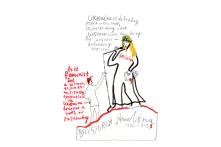
Sofia Cheliak
Journalist, cultural manager, and programme director of Lviv BookForum
It sometimes happens that when you become close to a person, you share daily problems, discuss matters large and small, do things together like choosing clothes – this person becomes an integral part of your life, and sometimes you treat them as if they were your own sibling. But when you have such a friendship with a remarkable person, there may be moments when their importance is revealed to you anew. This was the case at a festival in Colombia where I had organised the Ukrainian programme, giving me an opportunity to attend all the events. Victoria Amelina (Vika) spoke at one of these about activism, and her co-panellists were women from all over the world. The moderator asked whether it was feminist to take part in the war. Vika replied that since we are fighting a defensive war and since it is a completely female reflex to defend your children, your home, and your loved ones, our participation in the war is very feminist. This made me see Vika in a different light again – I was so proud of my friend.
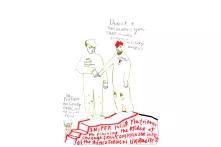
One of the achievements of female veterans was the adoption of new Ukrainian legislation in 2018 that recognised women in the army. Prior to that, women in the Ukrainian army could only be cooks, seamstresses, washroom attendants or, in the best case, nurses. Sniper Yulia Matvienko (nicknamed “Squirrel”) was listed as a nurse. So when, in spring 2016, she received the Order for Courage from Viktor Muzhenko, Commander-in-Chief of the Armed Forces of Ukraine, the highest military position in the country after the Supreme Commander-in-Chief, she asked ironically at the award ceremony: “Doesn’t he feel embarrassed that a nurse has been honoured with such a high military award?” In an interview on 25 March 2020 as part of the Povaha (“Respect”) campaign against sexism in media and politics, Yulia added: “Women fought in both the First and Second World Wars, and they did a fine job of it, serving as pilots and snipers. When war comes, women go and fight, and they do it just as well as men. But when the war is over, everyone says ‘No, it’s not a woman’s business, women didn’t fight.’”
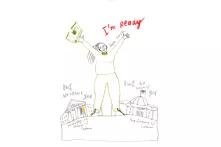
Lesia Hanzha
Military officer and former journalist
Defence capability is not only about missiles and tanks. It also includes properly managing the most valuable resource – people. The Ukrainian army is currently focused only on men. It has no idea what to do with women who want to fight, and no understanding of what tasks to assign them so that they can be effective on the battlefield. But since there is now a shortage of military personnel, the Ukrainian army must learn how to use women effectively. This is no longer a matter of gender equality, it is a matter of winning or losing the war – in other words, a matter of life or death. There are examples of discrepancies in all areas of the military, including the provision of clothing. The Ukrainian army did not issue female-friendly field uniforms until August 2023 and is still trying to provide women’s bulletproof vests. But that came after volunteers with the nonprofit ArmWomenNow sewed some 5,000 female uniforms, prompting a working group comprised of the Defence Ministry and the public initiative Forma Two to address the issue. Before that, women used pins, straps, and alterations as a makeshift solution. They also gave their issued underwear to fellow male soldiers, because menstruation made the boxers completely unsuitable for women.
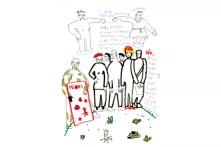
Oksana Potapova
Feminist researcher and women’s rights activist
The dominant perception of women in feminist literature on wars, as well as in international peace and humanitarian discourses, includes images of women as victims, women as caregivers, women as peacebuilders, but rarely as those who are actively taking part in military affairs – as soldiers, paramedics, or decision-makers on political and security matters. In feminist discourses, engaging in military affairs is often seen as a sign of militarisation, which is what feminists are supposed to resist, criticise, and deconstruct. While there are ample valid reasons to be critical of militarism, not all forms of engagement with security issues are a sign of increasing militarisation. In certain contexts, such as when society is faced with a war of defence, ensuring security from armed actors and from the longer-term effects of war becomes the responsibility of local communities, including women. Learning about anti-mine safety measures, acquiring self-defence skills, and joining the army to defend national sovereignty – all these and more are the roles of women in war. This does not necessarily mean that women have fallen under the influence of the militaristic, patriarchal order. Quite the contrary, they can be expressions of women’s agency, leadership, and emancipation in the context of national and social liberation.

Oksana Semenik
Art historian, researcher, and author of the Twitter (now X) account “Ukrainian Art History”
At first I thought it was me in the picture. But then I saw the laptop and the tins of food and realised that my experience in the basement was different. During the occupation in Bucha, there was no electricity and we lived in the basement of a kindergarten with dozens of other people. But I was accompanied by my cat who also became a victim of Russia’s armed aggression. I feel sorry for her more than for myself. Since there were other animals in the basement too, she had to spend most of her time in a pet carrier that was almost like a cage. She saved our lives when she ran into the very carrier she hated so much, alerting us to flee the apartment. A few minutes later Russian tanks drove into our street. Another time she sensed that a plane was approaching, which went on to drop a bomb on a military hospital in Irpin. Fortunately, the Russian pilot missed and the bomb did not explode. My Vatrushka also anticipated the opening of the so-called green corridors. She washed her face for a long time, getting ready to go out. When we were leaving Bucha on foot for Kyiv, we carried her half the way. She was so scared that she threw up all over herself. And I thought, why does this cat have to endure a war? How much does this little black creature, which we took off the streets in the summer of 2021, have to endure? She is our mascot. We were saved, we were lucky. But many Bucha residents were not. Some, especially those who believe the propaganda, say that two empires are fighting – the Russian and the American. My cat has only seen Russian occupiers and Ukrainian soldiers.

Yana Salakhova
Theatre of the Oppressed practitioner and gender equality expert
War does not care what gender you are. The chance of being killed by a missile or a drone is quite high for every person living in Ukraine. There are no safe places here, absolutely none. When people talk about privilege, they often talk about power and how it is distributed. Russia’s invasion of Ukraine has made security a key privilege. And since nowhere is safe in Ukraine, everyone is equal in terms of the perilous position they are in. People differ only in the strategy they use to cope with this danger. Some people call themselves fatalists, because they have already accepted that one day the Russian roulette will select them. Others make every effort to prevent this from happening, for example by sleeping on a cot in the subway station, because if there is a missile attack at night, they won’t have time to get there.
Do you feel that you have the privilege of living in safety? What power does it give you?
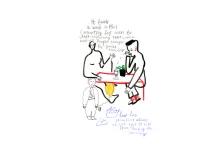
Yana Salakhova
Theatre of the Oppressed practitioner and gender equality expert
Legislation restricting men from leaving Ukraine during martial law was adopted on 21 October 1993. Not long thereafter, on 27 January 1995, the Cabinet of Ministers adopted Resolution No. 57, which laid down rules as to when Ukraine citizens could cross the state border.
Most Ukrainians were unaware these laws existed until 24 February 2022, when the President of Ukraine declared martial law in the country through Decree No. 64/2022. Since then, men aged 18 to 60 have been prohibited from travelling abroad, unless they are accompanying an adult or a child with a disability, a person in need of constant care, or a child. Men in this age group are also permitted to travel abroad if
- three or more children under the age of 18 are dependent on them;
- they are raising a child under the age of 18 on their own;
- they are raising a child with a disability under the age of 18;
- an adult child who is a person with a disability of group I or II is dependent on them;
- an orphan or a child deprived of parental care under the age of 18 is dependent on them; or
- they are engaged full-time in caring for a sick relative.
Paradoxically, these are perhaps the only legal provisions that underscore the importance of the invisible work predominantly done by women – the care and supervision of children, persons with disabilities, and the elderly. This is another strange way that war strengthens gender equality and recognizes the value of providing care to vulnerable groups.
Do you know any laws in your country that are invisible in peacetime, but would make you think about your gender if war broke out?
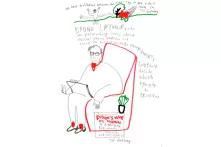
Alevtina Kakhidze
Artist, designer, educator, and curator
In March 2022 I often went down to the basement, to the beets and cabbage, and lay there hiding from the fighting between the Russian and Ukrainian armies. And while the Kyiv region was being liberated from Russian troops, I often went down there because air raid sirens were warning of incoming Russian missiles. I remember the day in the basement when I had a mental conversation with Bruno Latour, an important philosopher for me because of his description of the human and the inhuman. He had read both the news of Russia’s full-scale invasion of Ukraine and a new report on climate change and could not decide which of these two tragedies he should be most concerned about.I depicted his uncertain state of mind in a series of drawings, and this is one of them. I ironically gave him a chance to make up his mind through a lottery in which there is only one outcome: any war is a war against women, men, cats, all life on the planet, a war which will definitely not postpone the climate crisis. In his latest text Latour wrote more about the war against Ukraine and about environmental wars, providing a more precise ranking of these two problems (as problem number one and problem number two) and giving more attention to the uniqueness of the war against Ukraine, where, according to him, weapons and energy resources have become part of a multifaceted problem of our time. I was excited, but also embarrassed at the thought of meeting him in person. My friends sent me photos of his events and lectures around Europe, saying, “Latour is here, can we show him your drawings?” He recently died, and now I will never be able to meet and talk with this eminent authority, who I cherished and then questioned in my own work.
See Bruno Latour’s article “Quelle entre-deux-guerres?”, available at: http://www.radio-univers.com/quelles-entre-deux-guerres-n1034/ (accessed August 2022).
See http://www.bruno-latour.fr/sites/default/files/downloads/179-CONTINENT-SORBONNE-GB-pdf.pdf
Based on correspondence with Boris Filonenko.
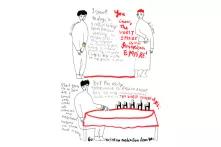
Oksana Potapova
Feminist researcher and women’s rights activist
At the beginning of Russia’s full-scale invasion of Ukraine, many leftist and feminist activists often used this common argument against arming Ukraine: “You are just being used by the American Empire, which wishes to expand its influence in Europe via NATO.” This argument appeared, for example, in the Feminists Against War manifesto.[1] Noam Chomsky, a well-known leftist intellectual, also said that Russia was fighting more humanely that the US. [2] These arguments were employed to discourage Ukrainians from seeking armed support and from resisting Russia in this war. Firstly, comparing the level of “inhumaneness” by different empires implies in itself that some lives are more valuable and some deaths less grievable than others. Secondly, this argument and the way it was voiced convey an implicit imperialist attitude towards Ukrainians by Western intellectuals. It implies that there is only one “real” empire in the world right now (the American Empire), and that all others are therefore anti-imperial forces. Ironically, this argument remains US-centric and therefore imperial in its nature, as it does not allow the possibility of other empires existing at the same time and exercising their influence in other regions of the world. Ukrainians have claimed that we do indeed have another empire next door, and we know its politics and its impact on us much better. The argument also supposes that Ukrainians – as colonised, invaded, vulnerable subjects on the global periphery – are not capable of knowing for themselves what is going on in their region geopolitically, militarily, and historically. Ukrainians are awarded the status of those who have “experience” but are not able to produce knowledge and analysis, which is a classical postcolonial condition, awarded to subaltern subjects by the global metropole and reflected poignantly in Gayatri Spivak’s famous essay “Can the Subaltern Speak?”. The author suggests that all attempts of subaltern to represent themselves will be inevitably mediated by the gaze of those who have power. Strategies of escaping this epistemic violence may include the convening of spaces where global South and peripheral subjects can engage in dialogue with each other, without mediation by Western actors.
[1] See Feminists Against War (2022), “Feminist Resistance Against War – A Manifesto”, Spectre, available at: https://spectrejournal.com/feminist-resistance-against-war/.
[2]See Vock, Ido (2023), “Noam Chomsky: Russia is fighting more humanely than the US did in Iraq”, The New Statesman, available at: https://www.newstatesman.com/the-weekend-interview/2023/04/noam-chomsky-interview-ukraine-free-actor-united-states-determines.
-----
This comic is part of the dossier Feminist Voices Connected.